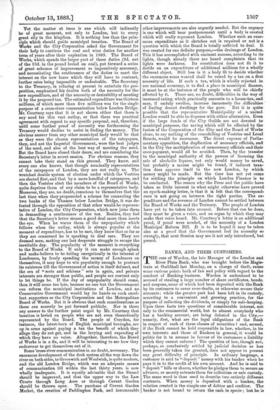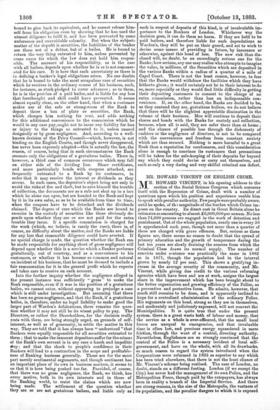BANKS, AND THEIR CUSTOMERS.
THE case of Warden, the late Manager of the London and River Plate Bank, who was brought before the Magis- trate at Guildhall last Monday, on a charge of theft, raises some curious points both of law and policy with regard to the conduct of Banking business. Warden is understood to be accused of stealing a large number of share certificates, bonds, and coupons, some of which had been deposited with the Bank by its customers to cover over-drafts, or otherwise secure their accounts; while the greater part had been left in its custody, according to a convenient and growing practice, for the purpose of collecting the dividends, or simply for safe-keeping. Upon these facts two questions of considerable interest, not only to the commercial world, but to almost everybody who has a banking account, are being debated in the City,— namely, first, what are the legal obligations of the Bank in respect of each of these classes of securities and, second, if the Bank cannot be held responsible in law, whether, in its -own interests and those of Bankers in general, it would be politic for it to assume in favour of its customers a liability which they cannot enforce ? The question of law, though not, perhaps, so conclusively settled by judicial decision as has been generally taken for granted, does not appear to present any great difficulty of principle. In ordinary language, a customer is said to "deposit" money with his banker when he pays it in to the credit of his own account. And he is said to " deposit " bills or shares, whether he pledges them to secure an advance, or merely entrusts them for collection or safe custody. The same word is thus used to describe two entirely different contracts. When money is deposited with a banker, the relation created is the simple one of debtor and creditor. The banker is not bound to return the cash in specie ; but he is bound to give back its equivalent, and he cannot release him- self from his obligation even by showing that he has used the utmost diligence to fulfil it, and has been prevented by some unforeseen and unavoidable calamity. But when the subject- matter of the depait is securities, the liabilities of the banker are those not of a debtor, but of a bailee. He is bound to return the very thing entrusted to him, unless prevented by some cause for which the law does not hold him respon- sible. The measure of his responsibility, as is the case with all bailees, depends upon whether he is or is not remuner- ated for his care. It is here that such uncertainty as there is in defining a banker's legal obligations arises. No one doubts that he is bound to take the most scrupulous care of securities which he receives in the ordinary course of his business, such, for instance, as stock pledged to cover advances ; as to them, he is in the position of a paid bailee, and is liable for any loss that forethought and skill could have prevented. It seems almost equally clear, on the other hand, that when a customer makes use of the safe or strong-room of the Bank to deposit there a box of plate or securities, the Bank, which charges him nothing for rent, and adds nothing for this additional convenience to the commission which he would in any case pay, ought not to incur any liability for loss or injury to the things so entrusted to it, unless caused designedly or by gross negligence. And, according to a well- known decision of the Privy Council—which, however, is not binding on the English Courts, and though never disapproved, has never been expressly adopted—this is actually the law, the reason, of course, being that in such circumstances the Bank assumes only the obligations of a gratuitous bailee. There is, however, a third case of common occurrence which may fall on either side of the dividing line. Share certificates, and more particularly bonds with coupons attached, are frequently entrusted to a Bank by its customers, in order that it may receive the interest or dividends as they accrue. In such cases, the depositor's object being not only to avoid the risks of fire and theft, but to save himself the trouble of collection, the documents are as a rule not shut up in a box which he alone can open, but are handed to the Bank and kept by it in its own safes, so as to be available from time to time, when the coupons have to be detached and the dividends claimed. The degree of care which the Banks are bound to exercise in the custody of securities like these obviously de- pends upon whether they are or are not paid for the extra trouble they incur. If a specific commission is charged for the work (which, we believe, is rarely the case), there is, of course, no difficulty about the matter, and the Banks are liable for any loss that reasonable diligence could have averted. If no special charge is made, the question whether the Bank can be made responsible for anything short of gross negligence will depend upon whether this is a service which a Banker performs gratuitously, out of courtesy, and as a convenience to his customers, or whether it has become so common and natural an incident of his business, that he must be deemed to include a fair remuneration for it in the general profit which he expects and takes care to receive on each account.
Into the further inquiry whether the negligence alleged in the present instance was sufficiently "gross" to make the Bank responsible, even if it was in the position of a gratuitous bailee, we cannot enter, without appearing to prejudge a case which is still under investigation. But assuming that there has been no gross negligence, and that the Bank, if a gratuitous bailee, is, therefore, under no legal liability to make good the larger part of Warden's defalcations, there remains the ques- tion whether it may not still be its wisest policy to pay. The Directors, or rather the Shareholders, for the decision really rests with them, are being strongly urged, on grounds of self- interest, as well as of generosity, to settle the matter in this way. They are told that it has always been "understood "that Bankers were equally responsible for all securities entrusted to them ; that to make the innocent depositors suffer for the crimes of the Bank's own servant is in any case a harsh and impolitic step; and that the shock to people's confidence in their Bankers will lead to a contraction in the scope and profitable- ness of Banking business generally. These are for the most part merely sentimental arguments, and though sentiment has an important place of its own in business matters, it seems to us that it is here being pushed too far. Provided, of course, that there was no gross negligence, the Bank, we think, has every motive, both in its own interests and in those of the Banking world, to resist the claims which are now being made. The settlement of the question whether they are or are not gratuitous bailees, and liable only as such in respect of deposits of this kind, is of incalculable im- portance to the Bankers of London. Whichever way the decision goes, it can do them no harm. If they are held to be paid bailees, and therefore liable for such depredations as Warden's, they will be put on their guard, and set to wo. rk to devise some means of providing in future, by insurance or otherwise, against this head of loss. The new risk thus dis- closed will, no doubt, be an exceedingly serious one for the Banks; how serious, any one may realise who attempts to imagine the value, in millions, of the Securities which are deposited in the various Banks within a radius of a quarter of a mile of Cape! Court. There is not the least reason, however, to fear that the Banks would withdraw the facilities which they have hitherto given; it would certainly not be to their interest to do so, more especially as they would find little difficulty in getting their depositing customers to consent to the charge of an extra commission, rather than lose an indispensable con- venience. If, on the other hand, the Banks are decided to be, as they contend they are, gratuitous bailees, we do not believe that there will be the slightest appreciable diminution in the volume of their business. Men will continue to deposit their shares and bonds with the Banks for custody and collection, because, when all is said, they are safer there than at home ; and the chance of possible loss through the dishonesty of cashiers or the negligence of directors, is not to be compared with the convenience and freedom from constant anxiety which are thus secured. Nothing is more harmful to a great Bank than a reputation for carelessness, and this consideration alone is enough to convince its customers that precautions will be taken for the safe-keeping of their deposits far beyond any which they could devise or carry out themselves, and such as only a very daring and very skilful criminal can defeat.



































 Previous page
Previous page